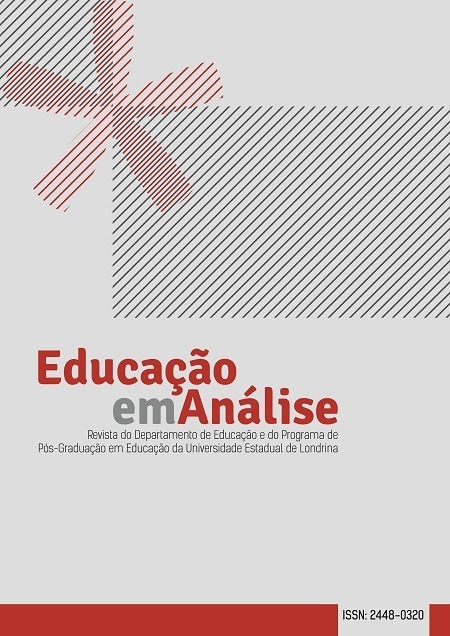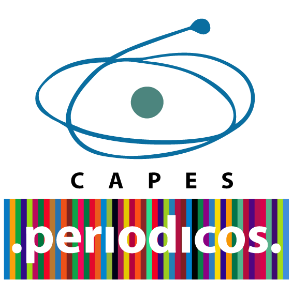Understanding historical time: a study with 6th grade portuguese students about chronology and chang
DOI:
https://doi.org/10.5433/1984-7939.2020v5n1p31Keywords:
Historical Time, Historical thinking, Temporal understanding, Change, chronology.Abstract
This article presents a contribution to understanding the way children understand historical time and emerges from an empirical study, which is predominantly qualitative and interpretative, carried out with Elementary School students of the 6th grade, in Portugal. With this study, we tried to perceive the students' ideas and conceptions of temporality, trough event ordering chronological historical facts as well as the construction of narratives, both subordinated to the programmatic content The April Revolution of 1974. A quantitative and qualitative data analysis was performed, in which students' answers were categorized according to differentiated thinking levels. The result show that students in this education level understand and use complex time concepts in the learning process of History, mainly related to chronology and change.Downloads
References
BARTON, K. C. Oh, that's a Tricky Piece!: Children Mediated Action, and the Tools of Historical Time. The Elementary School Journal, Chicago, v. 37, n. 1, p. 89-106, 2002.
BARTON, K. Helping students make sense of historical time. Primary history, Londres, v. 37, p. 13-14, 2004.
BARTON, K. Back when God was around and everything: elementary children's understanding of historical time. In: LEVSTIK, L.; BARTON, K. Researching history education. New York: Routledge, 2008. p. 71-107.
BRAUDEL, F. História e ciências sociais. Lisboa: Editorial Presença, 1990.
CARRETERO, M.; IGNÁCIO, J.; ASENSIO, M. La enseñanza de las ciencias sociales. Madrid: Visor, 1989.
COOPER, H. Didáctica de la historia en la educación infantil y primaria. Madrid: Ediciones Morata, 2002.
DOWNEY, M.; LEVSTIK, L. Teaching and learning history. In: SHAVER, J. P. (ed.) Handbook of research on social studies teaching and learning. New York: Macmillan, 1991. p. 400-410.
DOMÍNGUEZ, J. Pensamiento histórico y evaluación de competencias. Barcelona: Editorial GRAÓ, 2015.
WALDY FILHO; PELLANDA, N. Estudar e viver a história: um olhar complexo sobre o estudo do passado. Educação em Análise, Londrina, v. 2, n. 1, p. 147-164, Jan./jun. 2017. Disponível em: http://www.uel.br/revistas/uel/index.php/educanalise/article/view/30620. Acesso em: 20 dez. 2019.
GROOT-REUVEKAMP, M.; VAN BOXTEL, C.; ROS, A.; HARNETT, P. The understanding of historical time in the primary history curriculum in England and the Netherlands, Journal of Curriculum Studies, Basingstoke, v. 46, n. 4, p. 487-514, 2014. Disponível em: http://dx.doi.org/10.1080/00220272.2013.869837. Acesso em: 15 jul. 2019.
HODKINSON, A. Historical time and the national curriculum. Teaching History, Londres, n. 79, p. 18-20, abr. 1995.
HODKINSON, A. Children's developing conceptions of historical time: analysing approaches to teaching, learning and research. 2003. Tese (Doutorado) - University of Lancaster, Lancaster, 2003. Não publicada.
JAHODA, G. Children's concepts of time and history. Educational Review, Edinburgh, v. 15, n. 287, p. 87-104, 1963.
LEE, P. Historical knowledge and the national curriculum. In: BOURDILLON, H. (ed.). Teaching history. London: Routledge, 1994. p. 41-47.
MATTOZZI, I. Obiettivo: formare il senso del tempo: per un curricolo verticale di educazione alle temporalità. Scuola Viva, [S. l.], n. 10/11, nov. 1990. Disponível em http://www.irre.toscana.it/multiverso/risorse/tavola/ivo_mattozzi_2.htm. Acesso em: 15 jul. 2019.
MIGUEL-REVILLA, D.; SANCHEZ-AGUSTI, M. Conciencia historica y memoria colectiva: marcos de analisis para la educacion historica. Revista de Estudios Sociales, Andes, n. 65, p. 113-125, 2018. Disponível em: https://doi.org/10.7440/res65.2018.10. Acesso em: 15 jul. 2019.
OAKDEN, E. C.; STURT, M. The development of the knowledge of time in children. British Journal of Psychology, London, v. 12, n. 4, p. 309-355, 1922.
PAGÈS, J.; SANTISTEBAN, A. La enseñanza del tiempo histórico: una propuesta para superar viejos problemas. In: GARCÍA, T. S. M. (coord.). Un currículum de ciencias sociales para el siglo XXI: qué contenidos e para qué. Sevilla: Díada Editora, 1999. p. 187-208.
PAGÈS, J. Conciencia y tiempo histórico. Perspectiva escolar, Barcelona, n. 332, p. 2-8, 2009. Disponível em: https://dialnet.unirioja.es/servlet/articulo?codigo=2899408. Acesso em: 20 dez. 2019.
PAGÈS, J.; SANTISTEBAN, A. La enseñanza y el aprendizaje del tiempo histórico en la educación primaria. Cad. Cedes, Campinas, v. 30, n. 82, p. 281-309, set./dez. 2010. Disponível em: https://www.cedes.unicamp.br/. Acesso em: 20 dez. 2019.
PATRIARCA, L.; ALLEMAN, J. Studying time: a cognitive approach. Social Education, Maryland, v. 51, n. 4, p. 273-277, abr./maio 1987.
PIAGET, J. A noção de tempo na criança. Rio de Janeiro: Editora Record, 1946.
PROENÇA, M. C. Ensinar/aprender história: questões de didáctic aplicada. Lisboa: Livros Horizonte, 1990.
RÃœSEN, J. Making sense of time: toward a universal typology of conceptual foundations of historical consciousness. In: RÃœSEN, J. (ed.). Time and history: the variety of cultures. New York: Berghahn Books, 2007. p. 7-18.
RÃœSEN, J. A função didática da história: a relação entre a didática da História e a (meta) História. In: SCHMIDT, M. A.; MARTINS, E. R. (ed). Jörn Rüsen: contribuições para uma teoria da didática da história. Curitiba: W. A. Editores, 2016a. p. 14-42.
RÃœSEN, J. O que é a cultura?: reflexões sobre uma nova maneira de abordar a história. In: SCHMIDT, M. A.; MARTINS, E. R (ed.). Jörn Rüsen: contribuições para uma teoria da didática da história. Curitiba: W.A. Editores, 2016b. p. 54-81.
SACRISTÁN, M. A. Recursos y técnicas para la comprensión del tiempo en educación primaria. 2012. Dissertação (Mestrado) - Universidade de Valladolid, Espanha, 2012.
STOW, W.; HAYDN, T. Issues in the teaching of chronology. In: ARTHUR, J.; PHILIPHS, R. (ed.). Issues in history teaching. London: Routledge Falmer, 2004. p.83-97.
SOLÉ, G. A história no 1.º ciclo do ensino básico: a concepção do tempo e a compreensão histórica das crianças e os contextos para o seu desenvolvimento. 2009. Tese (Doutorado) - Universidade do Minho, Braga, Portugal, 2009.
SOLÉ, G. A compreensão do tempo e do tempo histórico pelas crianças: um estudo de caso com alunos portugueses do 1º. CEB. Diálogos, Mato Grosso, v. 19, n. 1, p. 143-179, 2015. Disponível em http://www.uem.br/dialogos/index.php?journal=ojs&page=issue&op=current. Acesso em: 15 maio 2019.
STRAUSS, A.; CORBIN, J. Basics of qualitative research: grounded theory, procedures and techniques. Newbury Park: Sage Publications, 1990.
THORNTON, S. J.; VUKELICH, R. Effects of children's understanding of time concepts on historical understanding. Theory and Research in Social Education Winter, [Maryland], v. 16, n. 1, p. 69-82, 1988.
VUKELICH, R.; THORNTON, S. J. Children's understanding of historical time: implications for Instruction. Childhood Education, Wheaton, v. 67, n. 1, p. 22-25, 1990.
WILSCHUT, A. A forgotten key concept?: time in teaching and learning history. In: INTERNATIONAL CONGRESS OF HISTORICAL SCIENCES, 21., 2010, Amsterdam. Anais […]. Amsterdam: University of Applied Sciences, 2010. p. 1-24.
WOOD, Sydney. Development an understanding of time-sequencing issues. Teaching History, Londres, v. 79, p. 11-14, 1995.
Downloads
Published
How to Cite
Issue
Section
License
Copyright (c) 2020 Educação em Análise

This work is licensed under a Creative Commons Attribution 4.0 International License.
Os artigos publicados na Revista Educação em Análise estão sob a Licença Creative Commons Atribuição 4.0 Internacional, garantindo Acesso Aberto. Deste modo, os autores mantêm os direitos autorais de seus trabalhos e, em caso de republicação, solicita-se que indiquem a primeira publicação nesta revista. Essa licença permite que qualquer pessoa leia, baixe, copie e compartilhe o conteúdo, desde que a devida citação seja feita. Além disso, autoriza a redistribuição, adaptação e criação de obras derivadas em qualquer formato ou meio, incluindo uso comercial, desde que a atribuição à revista seja mantida.
A revista se reserva o direito de efetuar, nos originais, alterações de ordem normativa, ortográfica e gramatical, com vistas a manter o padrão culto da língua e a credibilidade do veículo. Respeitará, no entanto, o estilo de escrever dos autores. Alterações, correções ou sugestões de ordem conceitual serão encaminhadas aos autores, quando necessário.
As opiniões emitidas pelos autores dos artigos são de sua exclusiva responsabilidade.
























